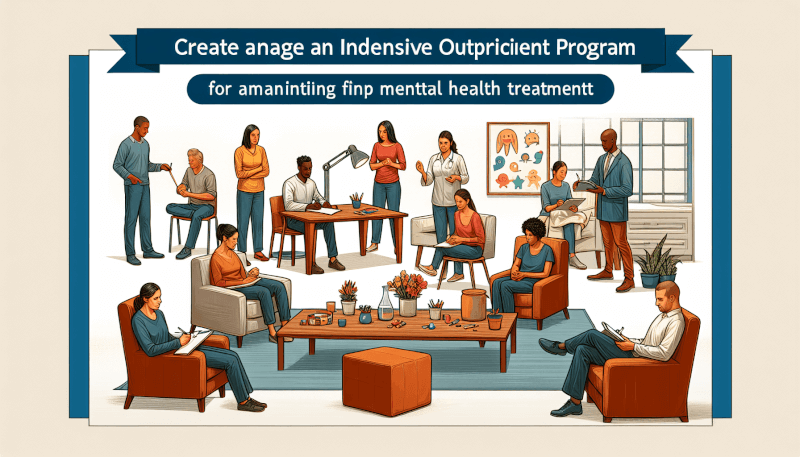Are you seeking a comprehensive and flexible approach to mental health treatment? Look no further than the Intensive Outpatient Program Mental Health. This program offers a unique and effective way to address your mental health concerns, providing you with the opportunity to receive intensive therapy and support while still maintaining your daily routine. Whether you’re facing depression, anxiety, or substance abuse issues, our program is designed to cater to your specific needs and help you achieve lasting recovery. With a team of experienced professionals guiding you every step of the way, you can trust that you’ll receive the care and support you deserve. Take the first step towards a healthier, happier future by joining our Intensive Outpatient Program Mental Health.

What is an Intensive Outpatient Program?
An Intensive Outpatient Program (IOP) is a type of mental health treatment that provides structured and comprehensive care while allowing individuals to maintain their daily routines. It is a step-down level of care between traditional outpatient therapy and inpatient hospitalization.
Definition
An Intensive Outpatient Program is a structured treatment program that offers a combination of individual therapy, group therapy, and psychiatric medication management for individuals struggling with mental health conditions such as anxiety, depression, bipolar disorder, and addiction. Unlike inpatient programs, IOP allows individuals to return home at the end of each session, making it a more flexible option.
Purpose
The purpose of an Intensive Outpatient Program is to provide individuals with the necessary tools, support, and education to manage their mental health conditions effectively. The program aims to help individuals develop coping skills, increase self-awareness, and foster a sense of community and support. It serves as a bridge between inpatient care and traditional outpatient therapy, offering a more comprehensive and intensive treatment option.
Components
An Intensive Outpatient Program typically consists of various components aimed at addressing different aspects of mental health. These components include individual therapy, group therapy, family therapy, medication management, and additional therapeutic approaches such as Cognitive Behavioral Therapy (CBT) and Dialectical Behavior Therapy (DBT). The program may also incorporate holistic approaches, such as mindfulness and relaxation techniques, to promote overall well-being.
Benefits of Intensive Outpatient Program
Choosing an Intensive Outpatient Program for mental health treatment has several benefits that contribute to its effectiveness and accessibility.
Flexibility
One of the significant advantages of an Intensive Outpatient Program is its flexibility. Unlike inpatient treatment programs, IOP allows individuals to attend therapy sessions while still being able to fulfill their daily responsibilities, such as work, school, or taking care of their families. This flexibility is particularly beneficial for individuals who cannot commit to a full-time residential program but still require intensive treatment.
Continuity of Care
Intensive Outpatient Programs offer a continuum of care that ensures individuals receive sustained support throughout their recovery journey. By participating in regular therapy sessions and having access to a network of healthcare providers, individuals can maintain their progress even after completing the program. This continuity of care helps prevent relapse and enhances long-term recovery outcomes.
Community Support
Intensive Outpatient Programs foster a sense of community and support among participants. By engaging in group therapy sessions, individuals have the opportunity to connect with others who are facing similar challenges. This sense of community support can be instrumental in alleviating feelings of isolation and providing a safe space for individuals to share their experiences, receive encouragement, and gain valuable insights.
Lower Costs
Compared to inpatient treatment, Intensive Outpatient Programs generally have lower costs. Since individuals do not require round-the-clock supervision and accommodation, the expenses associated with residential care are significantly reduced. This affordability gives more individuals access to quality mental health treatment, ensuring that financial constraints do not become a barrier to seeking help.
Who Can Benefit from Intensive Outpatient Program?
Intensive Outpatient Programs are designed to support a wide range of individuals struggling with mental health conditions. While the severity of the condition may vary, IOP can be an effective option for:
Individuals with Mild to Moderate Mental Health Conditions
Intensive Outpatient Programs are well-suited for individuals with mild to moderate mental health conditions. These programs provide the necessary support and resources to manage symptoms and develop effective coping strategies without the need for hospitalization. IOPs offer a comprehensive and structured treatment approach that can help individuals restore their mental well-being.
Those Seeking Alternatives to Inpatient Treatment
Some individuals may prefer alternatives to inpatient treatment for various reasons, such as personal commitments, work obligations, or a desire to maintain a sense of independence. Intensive Outpatient Programs offer a more flexible treatment option that allows individuals to receive the care they need while still being able to fulfill their responsibilities and obligations.
Individuals with Supportive Home Environments
Intensive Outpatient Programs can be particularly beneficial for individuals with supportive home environments. By participating in IOP, individuals can receive the necessary treatment and support while still being surrounded by their loved ones. The presence of a supportive and understanding family can greatly contribute to the success of the treatment and the overall well-being of the individual.
Common Therapeutic Approaches in Intensive Outpatient Program
Intensive Outpatient Programs utilize various therapeutic approaches to address the specific needs of individuals with mental health conditions. These approaches may include:
Cognitive Behavioral Therapy (CBT)
CBT is a well-established therapeutic approach that focuses on identifying and changing negative thought patterns and behaviors. In an Intensive Outpatient Program, CBT may be used to help individuals understand the connection between their thoughts, emotions, and behaviors, and develop healthier ways of thinking and responding to challenging situations.
Dialectical Behavior Therapy (DBT)
DBT is a form of therapy that combines elements of CBT with mindfulness techniques. It aims to help individuals regulate their emotions, develop healthy coping strategies, and improve interpersonal skills. DBT is often beneficial for individuals struggling with mood disorders, self-harm behaviors, and difficulty managing intense emotions.
Group Therapy
Group therapy is a fundamental component of Intensive Outpatient Programs. It provides a supportive and non-judgmental environment for individuals to share their experiences, learn from one another, and develop interpersonal skills. Group therapy allows participants to connect with others who can relate to their struggles, fostering a sense of solidarity and facilitating personal growth.
Family Therapy
Family therapy involves the participation of family members or loved ones in the treatment process. It aims to improve communication, strengthen relationships, and create a supportive and understanding family system. Family therapy can help individuals establish a solid support network and address underlying family dynamics that may contribute to their mental health conditions.
Medication Management
Medication management is an essential component of Intensive Outpatient Programs, especially for individuals with mental health conditions that require pharmacological intervention. A skilled psychiatrist works closely with each individual to evaluate and prescribe appropriate medications, monitor their effectiveness, and make any necessary adjustments to achieve optimal outcomes.

Typical Schedule and Duration of Intensive Outpatient Program
The schedule and duration of an Intensive Outpatient Program may vary depending on the specific program and the needs of the individual. However, there are some general factors to consider:
Program Schedule
IOPs typically offer daytime or evening sessions to accommodate various schedules. Daytime programs usually run for a few hours each day, allowing individuals to attend therapy while still having time for work or other responsibilities. Evening programs are suitable for individuals who work during the day or have daytime commitments.
Duration of Treatment
The duration of an Intensive Outpatient Program varies depending on the individual’s needs and progress. On average, IOPs may last anywhere from four to twelve weeks. However, the length of treatment can be adjusted based on the individual’s response to therapy and the therapist’s recommendations.
Number of Weekly Sessions
Intensive Outpatient Programs usually require individuals to attend therapy sessions multiple times a week. The number of sessions can range from three to five per week. This frequency allows for consistent support and progress monitoring, fostering a sense of routine and structure.
Length of Each Session
The length of each therapy session in an IOP typically ranges from two to four hours. The longer sessions give individuals sufficient time to engage in individual therapy, group therapy, and other therapeutic activities. The extended duration allows for in-depth exploration of topics, ample time for participation, and a comprehensive treatment experience.
Requirements and Eligibility for Intensive Outpatient Program
To participate in an Intensive Outpatient Program, certain requirements and eligibility criteria must be met. These may include:
Initial Assessment
Individuals interested in an Intensive Outpatient Program usually undergo an initial assessment process. This assessment involves an evaluation by mental health professionals to determine the individual’s suitability for IOP and to understand their needs and treatment goals. The assessment may include a clinical interview, psychological testing, and a review of the individual’s medical and mental health history.
Commitment to Participate
To benefit fully from an IOP, individuals must demonstrate a commitment to actively participate in the program. This may involve attending all scheduled therapy sessions, actively engaging in individual and group therapy, complying with the treatment plan, and actively working towards personal goals. Commitment to the program is crucial for successful outcomes.
Clinical Evaluation
A clinical evaluation may be conducted to assess the individual’s mental health condition and determine an appropriate treatment plan. This evaluation may involve collaborating with other healthcare providers, such as psychiatrists or therapists, to ensure a holistic approach to mental health treatment. The clinical evaluation helps tailor the IOP to the individual’s unique needs and ensures the effectiveness of the program.
Challenges and Considerations in Intensive Outpatient Program
While Intensive Outpatient Programs offer numerous benefits, certain challenges and considerations should be acknowledged and addressed to ensure a successful treatment experience:
Balancing Work and Treatment
One of the main challenges individuals may face in an IOP is balancing their work or other commitments with the demands of therapy. Prioritizing and managing time effectively becomes crucial to ensure full participation in the program. It may be necessary for individuals to make adjustments to their work schedule or notify employers to create a supportive environment that allows for therapy attendance.
Maintaining Privacy and Confidentiality
Privacy and confidentiality are essential in mental health treatment. Individuals participating in an IOP should have a clear understanding of their rights to confidentiality and the measures in place to protect their privacy. Open communication with the treatment team regarding confidentiality policies and concerns can help ease any anxieties individuals may have and foster a trusting therapeutic relationship.
Relapse Prevention
Intensive Outpatient Programs aim to equip individuals with the necessary tools and skills to prevent relapse. However, it is essential to recognize that relapse is a possibility, especially in the early stages of recovery. IOPs should provide ongoing support and guidance to individuals on relapse prevention strategies, coping skills, and available resources to minimize the risk of relapse and promote long-term recovery.
Success Rates and Long-Term Outcomes of Intensive Outpatient Program
Research on the effectiveness of Intensive Outpatient Programs has shown positive outcomes and long-term benefits for individuals seeking mental health treatment.
Research Findings
Studies have found that individuals who participate in IOPs often experience significant improvements in their mental health symptoms, overall functioning, and quality of life. Research has shown that IOPs can effectively reduce symptoms of anxiety, depression, and addiction, leading to improved well-being and increased psychological resilience.
Reduced Hospitalization Rates
One of the major advantages of IOPs is their potential to reduce rates of hospitalization. By providing individuals with necessary and intensive support in an outpatient setting, many emergency room visits and inpatient admissions can be avoided. This not only helps individuals avoid the disruption and cost associated with hospitalization but also promotes smoother transitions between different levels of care.
Improved Quality of Life
Participating in an Intensive Outpatient Program can lead to a significant improvement in the overall quality of life for individuals with mental health conditions. By addressing the underlying causes and symptoms of their conditions, individuals can experience enhanced emotional well-being, healthier relationships, better job performance, and an increased ability to engage in meaningful activities.
Continued Support
The long-term outcomes of Intensive Outpatient Programs are often positive due to the emphasis on continued support and aftercare. Many IOPs provide individuals with resources and referrals to community support groups, outpatient therapy providers, and ongoing psychiatric care. This continued support plays a crucial role in sustaining recovery, promoting accountability, and reducing the risk of relapse.
Finding the Right Intensive Outpatient Program
Finding the right Intensive Outpatient Program is essential for individuals seeking effective mental health treatment. Consider the following steps to assist in the search:
Researching Available Programs
Start by researching local Intensive Outpatient Programs. Consider factors such as program philosophy, treatment approaches, available therapies, and the expertise of the treatment team. Reading reviews or testimonials from individuals who have completed the program can provide valuable insights into the program’s effectiveness and suitability.
Consulting with Healthcare Professionals
Consulting with mental health professionals, such as therapists, psychiatrists, or primary care physicians, can provide valuable recommendations and insights. These professionals can help assess individual needs and preferences and recommend an IOP that aligns with the specific mental health condition and treatment goals. They may also collaborate with the IOP’s treatment team to ensure a coordinated and comprehensive approach to care.
Program Accreditation and License
When considering an Intensive Outpatient Program, it is important to verify the program’s accreditation and licensing. Accreditation ensures that the program meets certain standards of quality and adherence to ethical practices. Licensing ensures that the program operates legally and complies with state or national regulations. This validation enhances trust in the program and its ability to deliver effective treatment.
Conclusion
Intensive Outpatient Programs are a valuable and accessible treatment option for individuals struggling with mental health conditions. Offering flexibility, continuity of care, community support, and lower costs, IOPs provide individuals with the tools and resources they need to manage their conditions effectively. By utilizing various therapeutic approaches, implementing a structured schedule, and evaluating individual needs, IOPs contribute to improved mental well-being, reduced hospitalization rates, and a better quality of life. Finding the right Intensive Outpatient Program involves thorough research, consulting with healthcare professionals, and considering program accreditation and licensing. With their positive impact on mental health and commitment to accessible and effective treatment, Intensive Outpatient Programs play a crucial role in supporting individuals on their journey to recovery.

